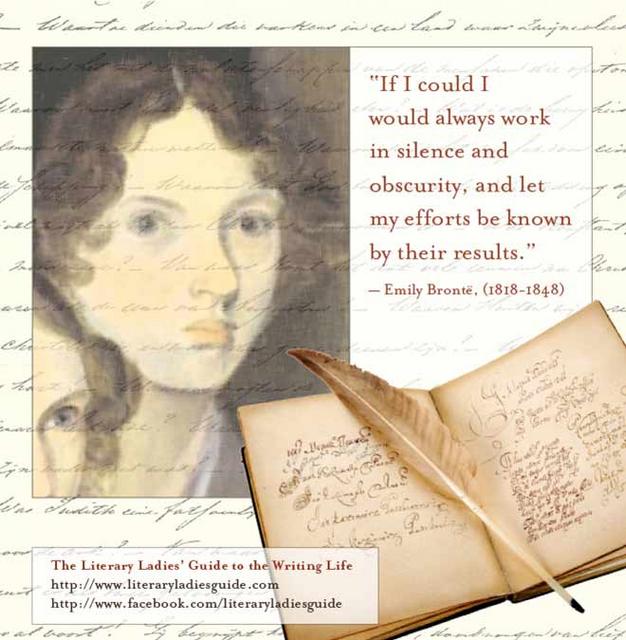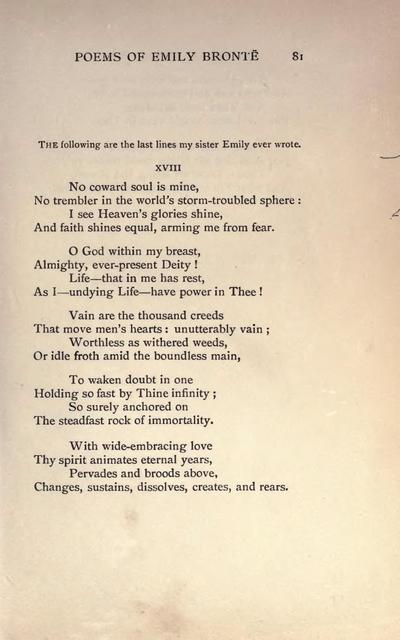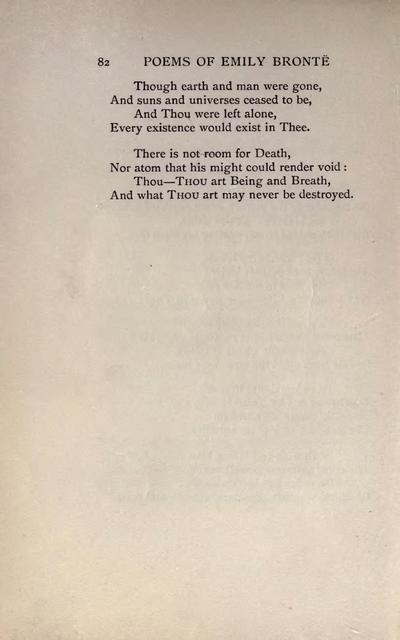Claradoon wrote:
I seem to recall that Charlotte published Wuthering Heights without the knowledge or permission of Emily, who never forgave her. Emily felt raped. The book was secret and was never intended to be read by others. Does anybody else know of something like this?
Hi Claradoon,
The Brontës' only brother was an opium addict and unable to support the family given insurmountable debt and fits of delirium. As spinsters, the sisters knew they would be evicted from the parsonage as insolvents should their father Patrick die during his perpetual curacy. They were incapable of self-sufficiency given the token of money bequeathed at Aunt Branwell's death, and they refused to marry for money alone. Emily was investing her inheritance money in the railway, but despite her shrewd business sense these dividends could not have supported the family long term. Their dream of opening a day school for girls failed despite Charlotte and Emily's formal Belgian education, and they began to feel destitute about their futures.
Charlotte found and read a private collection of Emily's
Gondal and personal poetry in late 1845, which infuriated Emily and caused a heated rift between the sisters. In time and with their father's approval, Charlotte, Emily and Anne agreed begrudgingly to co-submit a collection of pseudonymous poetry for publication and sale. The tome of poetry they published was entitled "Poems: By Currer, Ellis and Acton Bell" (1846, Aylott and Jones). The Brontës had to pay for its publication themselves and it sold just two copies, although the reviews were extremely positive in favour of Emily, most particularly. She was recognised as a brilliant poet.
The sisters then endeavoured to publish a three volume work of fiction comprised of
The Professor (originally
The Master),
Wuthering Heights and
Agnes Grey.
The Professor was rejected repeatedly. There is speculation that Volume II of
Wuthering Heights was written and appended post-script to replace
The Professor and thus complete a three volume set, which was traditional at that time, along with
Agnes Grey. In the meantime Charlotte began writing
Jane Eyre in Manchester, while her father had unmedicated eye surgery and while Charlotte herself suffered excruciating dental pain requiring but not receiving a root canal treatment.
Jane Eyre was published in October, 1847 as a stand-alone novel because of its size, and it became an immediate sensation.
WH and
Agnes were published together as a three volume set two months later, in December 1847, by Thomas Newby and Sons.
The early reviews of
WH were harsh. (See my early posts). Emily died aged 30 in December 1848, almost a year to the day after
WH was published; few copies of the novel had sold because Emily was perceived as blasphemous and a crazed heretic for rejecting religious salvation. Anne's book was called didactic or summarily ignored, although seen for its good merits.
Charlotte attempted to salvage Emily's posthumous reputation as an author by revising the second edition of
Wuthering Heights (1850) and appending a conciliatory
Preface which describes her sister as a type of mystic who wrote only by force or inspiration beyond her control. By this, Charlotte hoped to absolve Emily's legacy of damnation.
Charlotte writes:
Had Ellis Bell been a lady or a gentleman accustomed to what is called ‘the world,’ her view of a remote and unreclaimed region, as well as of the dwellers therein, would have differed greatly from that actually taken by the home-bred country girl. Doubtless it would have been wider — more comprehensive: whether it would have been more original or more truthful is not so certain. As far as the scenery and locality are concerned, it could scarcely have been so sympathetic: Ellis Bell did not describe as one whose eye and taste alone found pleasure in the prospect; her native hills were far more to her than a spectacle; they were what she lived in, and by, as much as the wild birds, their tenants, or as the heather, their produce. Her descriptions, then, of natural scenery are what they should be, and all they should be.
Where delineation of human character is concerned, the case is different. I am bound to avow that Emily had scarcely more practical knowledge of the peasantry amongst whom she lived, than a nun has of the country people who sometimes pass her convent gates. My sister’s disposition was not naturally gregarious; circumstances favoured and fostered her tendency to seclusion; except to go to church or take a walk on the hills, she rarely crossed the threshold of home. Though her feeling for the people round was benevolent, intercourse with them she never sought; nor, with very few exceptions, ever experienced. Yet she know them: knew their ways, their language, their family histories; she could hear of them with interest, and talk of them with detail, minute, graphic, and accurate; but with them, she rarely exchanged a word.(Charlotte Brontë's Preface to the second edition of
Wuthering Heights, 1850. Excerpt).
This
Preface perpetuated the myth of Emily as a mystic who could not control her style of writing. Some also read Charlotte's
Preface as evidence that Emily was autistic, suffering from agoraphobia, mutism and an obsession with the land or its wildlife. That theory remains today. There is also a theory that Branwell wrote or co-wrote Wuthering Heights with Emily. Indeed, many of the characters' Byronic archetypes are found in their Glass Town poetry from childhood; however, Branwell's role has since been dismissed. His prose writing was inarticulate by that point in his life, because of alcoholism and addiction. Some of his poetry was excellent, but it did not match Emily's style.
It is rare for scholars to accede that Emily was simply a brilliant writer, well-read and well-educated, who constructed the most powerful novel in English Literature without some type of crutch.
Emily never wanted her name to be published, and tension built when Charlotte became a literary celebrity during the last year of Emily's life, thus revealing her gender as well as her identity as the "reclusive" sister. I often feel that out of respect for Emily's wishes, "Ellis Bell" should be the novel's given author.
Many argue that Emily's talent as a philosopher, poet and essayist surpass her merit as an author of prose.
Emily may have begun a second manuscript prior to her death (based on a suggestive note from her publisher asking for its rights), but we will never know. If such manuscript did exist, it was burned or destroyed by Charlotte in an effort to save her sister's reputation post-
Heights.
Sorry for the ramble. I needed one today.



~ No Coward Soul is Mine ~
Rest in Peace, Emily Jane

_________________
I never give you my number, I only give you my situation.
Beatles
Last edited by IsabellaLinton on 22 Oct 2018, 8:43 am, edited 2 times in total.